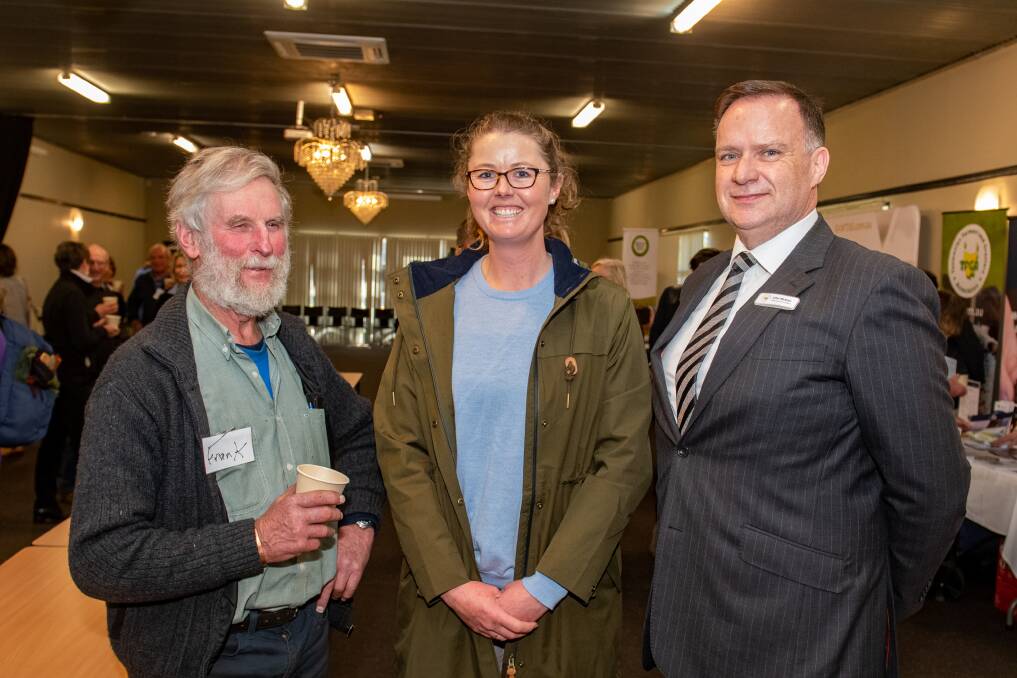
More than 100 farmers, scientists and academics came together on Wednesday to address the issue of climate change in the agricultural industry as part of the first Tasmanian Climate Smart Agriculture Conference.
Subscribe now for unlimited access.
or signup to continue reading
Organised by Farmers for Climate Action and the Tasmanian Farmers and Graziers Association, the conference included presentations by academics from the University of Tasmania and Southern Cross University as well as a range of industry experts.
TFGA chief executive John McKew said with climate change a real concern the event provided a forum for the industry to discuss the issues affecting farmers on a global, national and state level.
READ MORE: Hodgetts shot down in Paralympic controversy
He said speakers at the conference would unpack industry-specific issues associated with a changing climate and offer long and short term solutions for producers.
"There's a lot of research going into mitigation strategies and how can we continue to produce the food we all need and the fibre we need, but helping to reduce the ever-increasing amount of contaminants, carbon dioxide, methane, etc. which is the primary cause of some of this climate change," he said.
"We're talking about some of these emerging strategies, about different pastures, different types of potential legumes that you can use to sequester carbon into the soil.
"We're talking about different supplementary feeding of animals to reduce methane emissions from our livestock, which we know has been a problem for a very long time."
READ MORE: JackJumpers name NBL's first-ever chairwoman
FCA director Brett Hall said the conference hoped to educate farmers about the relationship between agriculture and climate change while providing a pathway for businesses to improve sustainability while maintaining profitability.
Mr McKew said promoting sustainable farming practices to reach net-zero carbon emissions by 2030 was a focus for the TFGA
"We're talking about many of the states and territories in Australia committing to 2030 net-zero emissions," he said.
"That's a pretty tight timeframe when you consider where we are to date, but I think it's a goal that we should be focusing on.
"Let's set the targets, let's look at the investments and the strategies we need to reach these, you know, we needed to have started long before today, but we need to get going now to try and make a difference."
Mr Hall said as a member of the National Farmers Federation the FCA's current target for net-zero was 2050, but would like to see the target achieved sooner.
"We'd like to see it earlier than that, we believe it needs to come down earlier, we are really promoting what the red meat industry is doing because they're aiming to achieve that by 2030," he said.
"The local FCA Tasmania, we're thinking we'd like for Tasmania to gain an advantage and move to being carbon neutral as the first state in Australia."
READ MORE: Police officer not guilty of footy assault
Mr Hall said becoming the first state in Australia to reach carbon neutrality would benefit farmers by avoiding potential tariffs placed on high carbon producers and by giving Tasmanian produce a marketing edge over the rest of the country.
"This is really just creating another point of difference for our projects, and it's just another string to our bow, to make our product more desirable for the consumer," he said.
Mr McKew said there was a misconception among the public that farmers were unwilling to address their role in climate change.
"There is a misconception and it's wrong because farmers are feeling the effects of climate change, intimately and directly every day," he said.
"When you're talking about drought, when you're talking about floods, when you're talking about fires, when you're talking about all these things farmers are often on the very front line of seeing, dealing with and having to work out how they're going to manage these issues.
"Farmers want to be part of the solution. They see themselves as, you know, this is impacting our business, our productivity, our profitability, we need to fix this."
Mr Hall explained modern farming practices were heavily informed by scientific advice and research and said addressing the role of farming in climate change was no different.
"Climate scientists have done all the research, they've told us what's going to happen and they're working out ways we can adapt to climate change and now we've just got to put that into place," he said.
Our journalists work hard to provide local, up-to-date news to the community. This is how you can continue to access our trusted content:
- Bookmark www.examiner.com.au
- Make sure you are signed up for our breaking and regular headlines newsletters
- Follow us on Twitter: @examineronline
- Follow us on Instagram: @examineronline
Follow us on Google News: The Examiner















